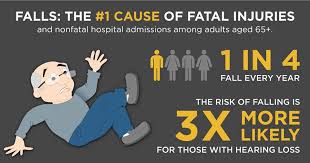This year is all about increasing our knowledge and sharing that with you. Jane and I are constantly reading our journals and attending workshops and seminars. I was tired of listening to the radio on my way to and from work as well as listening to music when exercising. Deciding how to better utilize my time, I joined Audiology Online. Audiology Online, is a division of the American Academy of Audiology and is a way a great way to read research articles, listen to webinars and audio presentations, while acquiring continuing education hours. So far I have listened to presentations on expanding our social media presence, tinnitus management and the changing generations and how they treat and view their hearing needs.
What I want to share with you today was an article that one of our patients brought into the office, titled Can Hearing Loss Increase Your Risk For Falling? Frequently, our folks will ask if getting hearing aids will improve their balance. It makes sense that it would, but here are the reasons why.
One-fourth of Americans age 65+ will fall every year. If you have hearing loss, your risk for falling greatly increases. In a study conducted at Johns Hopkins University School of Medicine, Dr. Frank Lin assessed hearing and balance in seniors and found that those with even mild hearing loss were three times more likely to suffer from an accidental fall. Remember that Dr. Lin, through brain imaging studies, determined there is a very high correlation between age-related untreated hearing loss and cognitive decline. We have talked about his work in previous articles.
How are hearing loss and falling related?
Balance – Your inner ear is a key player when it comes to balance. Your vision and proprioception (awareness of the position and movement of the body) are two other major players. Your inner ear provides signals to your brain that controls your spatial reasoning, range of motion, and equilibrium – all vital functions for balance. If there is an issue with your inner ear, those balance functions may not work as they should and put you at an increased risk for falling.
Cognitive Load – Untreated hearing loss puts added strain on your brain to decipher sound signals affecting communication. This is commonly referred to as “cognitive load”. Dr. Lin reports that if your brain is using more energy to hear, there may be fewer cognitive resources to help maintain balance.
So the major question is: “Can hearing aids reduce my risk of falling?” And the answer is most definitely YES. A Washington University School of Medicine study found that participants who wore hearing aids had better balance when their hearing aids were turned on vs off. Researcher Dr. Timothy Hullar’s hunch is that hearing aids make people more alert and help them “use sound information as auditory reference points or landmarks to help maintain balance”. Additionally, using hearing aids relieves cognitive load, reducing the risk of falling.
Falls are the leading cause of fatal injury in older adults. There are many things you can do to reduce your risk of falling. It all begins with scheduling a hearing evaluation. Give Beth or Jamie a call at (704) 212-2376 to take the necessary steps to improve your hearing ability and reduce your risk of falls. Remember to check out our website: www.hearingsolutionsofnc.com and like us on Facebook for more information. Jane and I look forward to seeing you soon.

